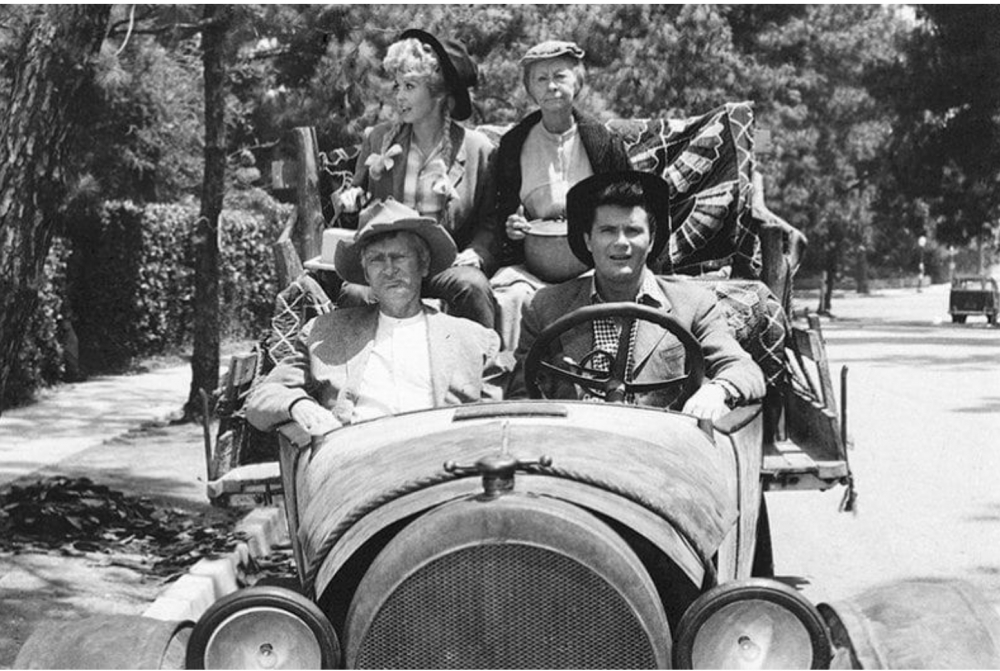If you’re old enough to remember The Beverly Hillbillies, you’re probably old enough to forget them, too. But in case you either too young to know what I’m talking about or you need a quick refresher, The Beverly Hillbillies was a 60s television show about the Clampett family, Ozark hillbillies who struck oil and now living the high life in California. According to the show’s theme song which has been inexplicably stuck in my head for more than a week now, Jed Clampett, the widowed family patriarch, “was a poor mountaineer who barely kept his family fed,” until (so the song continues) “one day he was out shootin’ for some food when up from the ground came a bubblin’ crude. Black gold. Texas tea.”
That lousy shot makes Jed a millionaire and so he packs up three generations of his wacky extended family and moves them all to Beverly Hills. (“Swimming pools. Movie stars.”) It is the quintessential American Dream story—except that it isn’t. The American Dream, our national ethos, is the idealized notion that anyone’s highest goals and aspirations can be achieved if he/she just works hard enough. The problem is that in Jed’s case, it wasn’t hard work that got him and his kin to posh Beverly Hills; it was dumb luck. He missed the squirrel but hit the jackpot.
Today, the American Dream is a bit trickier to conceptualize, let alone achieve. It conjures up images of migrant families from Central America, refugees from the Middle East and Central Asia, apparently even people from Baltimore. The 99% clawing their long, slow way up toward the 1%. Pretty long odds, if you ask me. Maybe even unreachable, as far away from fulfillment as Don Quixote’s unreachable star.
It was James Truslow Adams who first introduced us to the notion of an American Dream in his 1931 book, “The Epic of America.” In it, Adams wrote about “that dream of a land in which life should be better and richer and fuller for everyone, with opportunity for each according to ability or achievement. It is a difficult dream for the European upper classes to interpret adequately, and too many of us ourselves have grown weary and mistrustful of it. It is not a dream of motor cars and high wages merely, but a dream of a social order in which each man and each woman shall be able to attain to the fullest stature of which they are innately capable, and be recognized by others for what they are, regardless of the fortuitous circumstances of birth or position.”
Adams knew of what he wrote. His paternal grandfather had deep Virginia roots, but his father had been born in Caracas, Venezuela. (His paternal grandmother was of Basque descent.) If ancestry.com had existed back in Adams’ day, it would surely have shown his DNA to be a bit of this and that—like most of us. But unlike many of us, Adams was lucky. He came from families of considerable means so his road to Dreamland was paved if not with gold, then at least with some pretty smooth macadam. So smooth, in fact, that it took Adams to a Pulitzer Prize in 1921—pretty impressive for a Venezuelan-born historian and freelance writer.
Adams believed the engine of the American Dream was education: from vocational training to the liberal arts and the classics and everything in between. Education was the quintessential American antidote to the rigidity of the European class-based model. To Adams, a willingness to work hard and to acquire knowledge could equip anyone with wings to rise and to be sure, we can still see instances of that today. But we also see something else: people struggling, falling behind, people for whom the dream is fading, even becoming a nightmare.
I wonder what Mr. Adams would think of today’s version of the American Dream. How would he accommodate all those seeking asylum at the border, all those tired, poor souls yearning to breath free who are wading the Rio Grande instead of sailing into New York harbor? Mr. Adams died in 1949—more than a decade before the Clampetts moved to Beverly Hills or, for that matter, before the Jeffersons (another TV family) started moving on up from Queens to Manhattan. Would he be inclusive and share his American Dream with them, too? Or would his American Dream be exclusive—whiter, angrier, more prone to violence?
What about yours?
I’ll be right back.
Jamie Kirkpatrick is a writer and photographer with homes in Chestertown and Bethesda. His work has appeared in the Washington Post, the Baltimore Sun, the Pittsburgh Post-Gazette, the Philadelphia Inquirer, the Washington College Alumni Magazine, and American Cowboy magazine. “A Place to Stand,” a book of photographs and essays about Landon School, was published by the Chester River Press in 2015. A collection of his essays titled “Musing Right Along” was published in May 2017; a second volume of Musings entitled “I’ll Be Right Back” was released in June 2018. Jamie’s website is www.musingjamie.com




Stephan Klingelhofer says
Brilliant. Just right. Let’s get back to basics .. and the Statue of Liberty.